by Heather Vickery | May 27, 2016 | General Assembly
General Assembly (GA) is a special opportunity for Unitarian Universalists to worship, witness, learn, connect, and join together in advancing human rights. The theme for GA 2016 is Heartland: Where Faiths Connect and will focus on interfaith work and answering the question “How are we crossing faith borders as we bring more love and justice into the world?” The UU College of Social Justice has planned some exciting workshops and events this year in Columbus, OH on this theme that we hope you will join us for. Also, you can stop by the UUSC/UUCSJ booth to say hello. We would love a chance to meet with you and help you find your place in the exciting work we do.
Here are the exhibit hall hours:
- Wednesday, June 22, 12:00–7:00 p.m.
- Thursday, June 23, 10:00 a.m.–4:45 p.m.
- Friday, June 24, 10:00 a.m.–7:00 p.m.
- Saturday, June 25, 10:00 a.m.–7:00 p.m.
- Sunday, June 26, 12:00–3:30 p.m.
Friday, June 24th
Beyond the Border: Local Actions on Immigrant Rights
Friday 6/24/2016, 4:45 – 6:00 p.m.
Hyatt – Union E
The UU College of Social Justice and Standing on the Side of Love bring groups to the U.S./Mexico Border to witness the crisis facing migrants and refugees when they arrive. Hear about the actions these participants have taken, and learn skills to mobilize your congregation, from supporting immigrant-led organizing like #Not1More to stopping new anti-immigrant policies.
- B Loewe, #Not1More and Mijente
Saturday, June 25th
Bridges Not Barricades: Faith in a Time of Fear
Saturday, June 25, 3:00 – 4:15 p.m.
Convention Center – E170-172
In a time when fear and the rhetoric of exclusion are on the rise, interfaith partnership is essential. Our theological diversity and commitment to tolerance position us well for these alliances, yet we are often unprepared to join in interfaith worship, prayer, or even conversation with people of different religions. How can we reclaim the vocabulary of our faith and take our place at the interfaith table?
- Rev. Kathleen McTigue, UUCSJ
To find out more about General Assembly, including information on registration, the schedule, housing, and more, visit the UUA’s website here.
Click here to find out more about UUSC’s workshops and events.
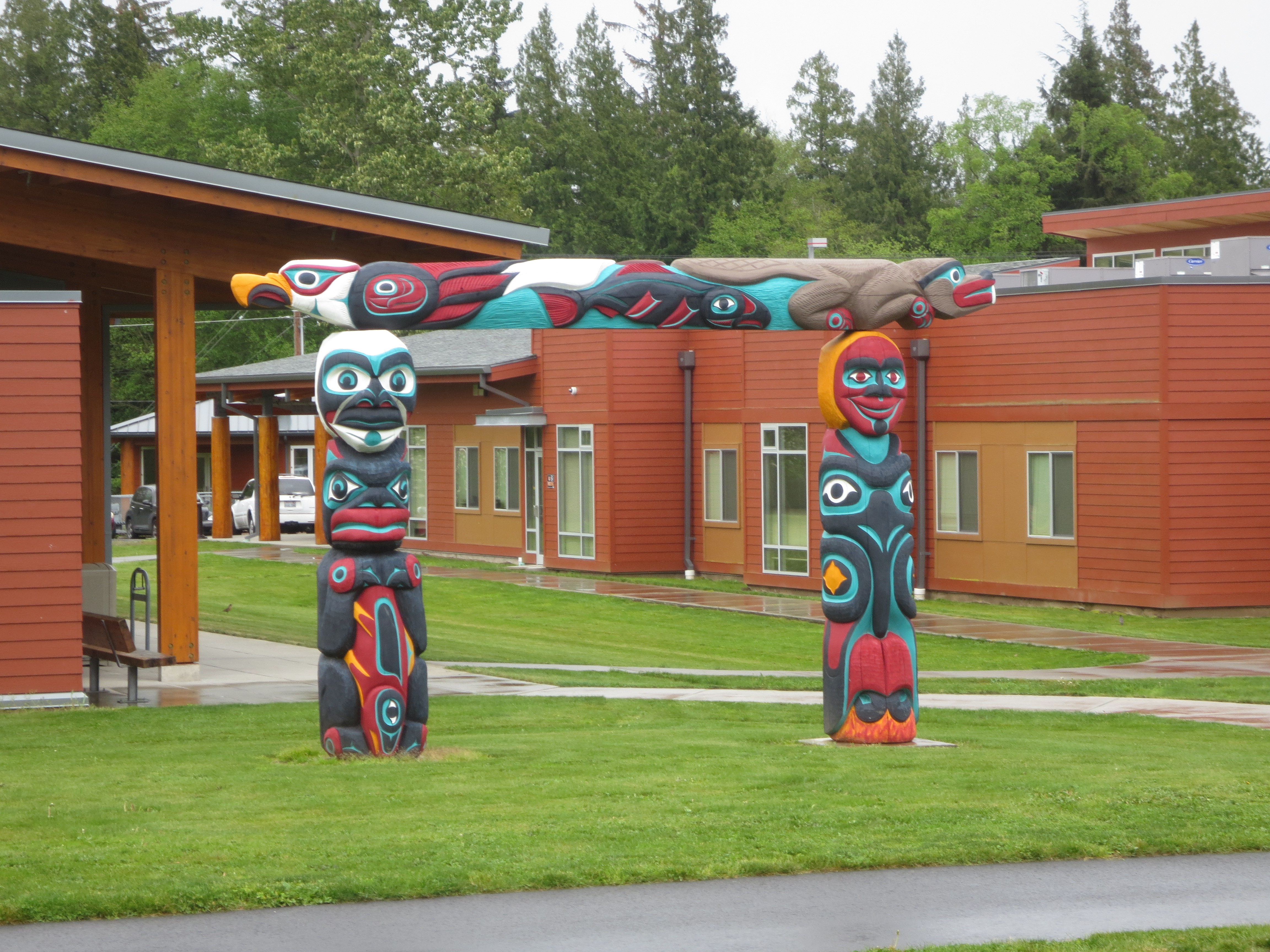
by Heather Vickery | May 20, 2016 | Environmental Justice, First Nations
Barbara Walden, a member of First Unitarian Church in Portland Oregon, was part of the College of Social Justice’s April Solidarity with Original Nations and Peoples delegation to the Lummi Nation in Bellingham Washington.
“It seems to me that anyone who cares to really think about the planet today has to hold both of these things in mind, to remember to see the beauty, and to still take joy in that beauty but not shy away from the hard and often ugly reality…”
~David Gessner, All the Wild that Remains
When I saw the announcement of the Unitarian Universalist College of Social Justice’s forthcoming program in my church newsletter, something spoke to me. Do you know that feeling? Something just pokes you and says, you need to do this. The program was a journey to the Lummi reservation near Bellingham, Washington to meet the Lummi people and learn from them; the program was called “Solidarity with Indigenous Peoples and Nations.” Part of the program was to learn the best way to be allies in solidarity with indigenous peoples as we face the coming of climate change. I had heard of the Lummi in connection with the controversy surrounding the proposed location of the Cherry Point Coal Terminal at the site of the Lummi sacred fishing grounds—just another chapter in the long sorry story of the degradation and theft of the lands and waters of the indigenous people of the United States. I knew that they were a small tribe, around 5,000 people living on the reservation, and I wondered if it would be possible for them to combat this threat even in alliance with others.
Earlier the Lummi reached out in a way that I had not encountered before. They made a totem pole and took it across the country to the source of the coal, to the indigenous people living in the Powder River country of Wyoming. All along the way they stopped at churches and asked all people to come forward and give their blessing to the totem pole. It was a sacred journey. I went to the St. Philip Neri Catholic Church with many others from around Portland, and we laid our hands on the pole to bless its journey and the hope and solidarity it represented. There we heard the pole’s carvers, who were leaders and elders of the Lummi Nation, as they spoke eloquently from heart and mind about their land and nation, and the interdependence of us all upon our living Earth. It made a deep impression on me.

Often when we are confronted with deep truth, it is hard to know what to do next. Sometimes you just need to wait for the next moment to arrive. I think that is why the brief announcement of the UUCSJ program struck me so hard. The deadline for applications was quite near, and by the time I did all the necessary figuring-out of things and crafting of my application it was the absolute last minute. I sent my application in and hoped for the best. I was so disappointed to receive a phone call saying that the program was overfilled, and I was so far down the waiting list that it was unlikely that I could go. So be it. I put it out of my mind. Then just a few days before the trip I received another phone call. A space had opened up and I could go. I madly read the book that was required reading for us: An Indigenous People’s History of the United States by Roxanne Dunbar-Ortiz. Wow. Already my mind was opened and I hadn’t yet left home.
I did not know it yet, but the next steps in the journey would open my heart as well as my mind. The Lummi people we met honored us with the heartfelt speaking and sharing that are at the root of their way of life. They taught me a lesson in the interrelationship of politics, diplomacy, treaty rights and traditional spiritual values as they stood proudly for their rights as a sovereign nation living as a government alongside international, federal, state, county and local governments. They showed me how they were working to lift up their youth, honoring and caring for their elders, providing for the economic development and social needs of a population with a 40% poverty rate and an ongoing burden of historical trauma, while at the same time preserving and passing on traditional spiritual culture, language, and way of life. It is an extraordinary task, and they work tremendously hard at it and do it admirably.
I quickly saw why the Lummi do not need our “help.” On the contrary, we have much to learn from them. The bonding of traditional spiritual and familial values rooted in the earth and waters with everything in life, and the strength and grounding this brings to their activities touched me profoundly. Many Lummi are able to live in two worlds. The carver of the totem poles is deeply versed in the law and speaks more knowledgeably than anyone to the intricacies of treaties, taxes, and other issues, as well as providing leadership as the Lummi play a role in national and international issues surrounding climate change. The tribe’s hereditary chief is not a political leader, but rather the carrier and teacher of the traditional language and culture in this holistic society. Well-educated tribal council members negotiate fearlessly and knowledgeably with international corporations to preserve their lands and waters. Lummi youth and elders traveled to the Paris Climate Summit to speak the truth of the peoples of the Salish Sea.
A pebble cast into water sends out ripples, the Lummi say. The pollution that has harmed the upstream waters of the river that flows through their land and closed their shellfish area affects other areas all around. The industrial overfishing of the shared waters diminishes not only the Lummi’s traditional catch but that of non-indigenous fishers as well. A coal terminal or other development at Cherry Point would endanger the whole Salish Sea which we call Puget Sound. I saw with my own eyes that at Cherry Point there is just a narrow passage between this land and the beautiful San Juan Islands and Vancouver Island. The loss of our animals and clean waters and the degradation of these places weighs on our spirits, too, and diminishes our lives. Their Earth is our Earth. It is not meant for our endless extraction, but for our care. We are one with the Earth. We need to stand together as we do our best to meet the changes our troubled Earth will bring us.
~Barbara Walden, First Unitarian Church, Portland, Oregon
[embedyt]https://www.youtube.com/watch?v=3WcoApS02to[/embedyt]
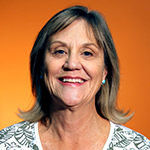
by Heather Vickery | May 13, 2016 | Congregational Trip, Immigration
Kim Duncan is a CSJ program leader from Portland Oregon. She led a delegation from two churches in Oregon, including her own.
Last October, a group from three UU congregations in Oregon went on CSJ’s Border Justice tour on the Arizona – Mexico border. On April 19th, we presented our experiences following the service at the First Unitarian Church of Portland. It was a rousing success!
Homemade Mexican tamales made by our friend, whose husband many of us have supported while he was in sanctuary in Portland – as well as an interest in US immigration policy and border conditions – drew nearly 40 people at Portland’s First Unitarian Church on Sunday.
What they heard, and what we were privileged to report on, were the experiences both wrenching and uplifting, that confronted us during our six day journey with CSJ partner, BorderLinks, in Tucson, Arizona.
We confronted a wall that was ugly, high and forbidding along our border. We saw altars along the desert migrant trails, commemorating the deaths of those who tried to cross but failed. We met migrants in Mexico who said they would continue to cross, in spite of the risks, because the danger they fled in Central America is worse, or because there are jobs waiting for them in the US. We saw the cast-off belongings left behind in the desert as immigrants made their way north. We witnessed 50 shackled migrants appear together in a courtroom and within a half-hour be mustered out and deported back to the border or to jail. We learned that private prison companies are making profits out of our border policies.
We were appalled.
We didn’t get clear answers about how to remedy this mess, but we met many heroic individuals trying to relieve the day-to-day suffering and angst in their communities. We met with people and organizations providing hidden way-stations in the desert that supply water and medical care to migrants; we talked with advocates trying to change the court processing; we visited with a woman named Rosa who was in sanctuary for over a year in Tucson, whose faith was inspiring. We were relieved to hear that her faith was rewarded a month later when she was free to go home.
We were humbled and touched by these experiences.
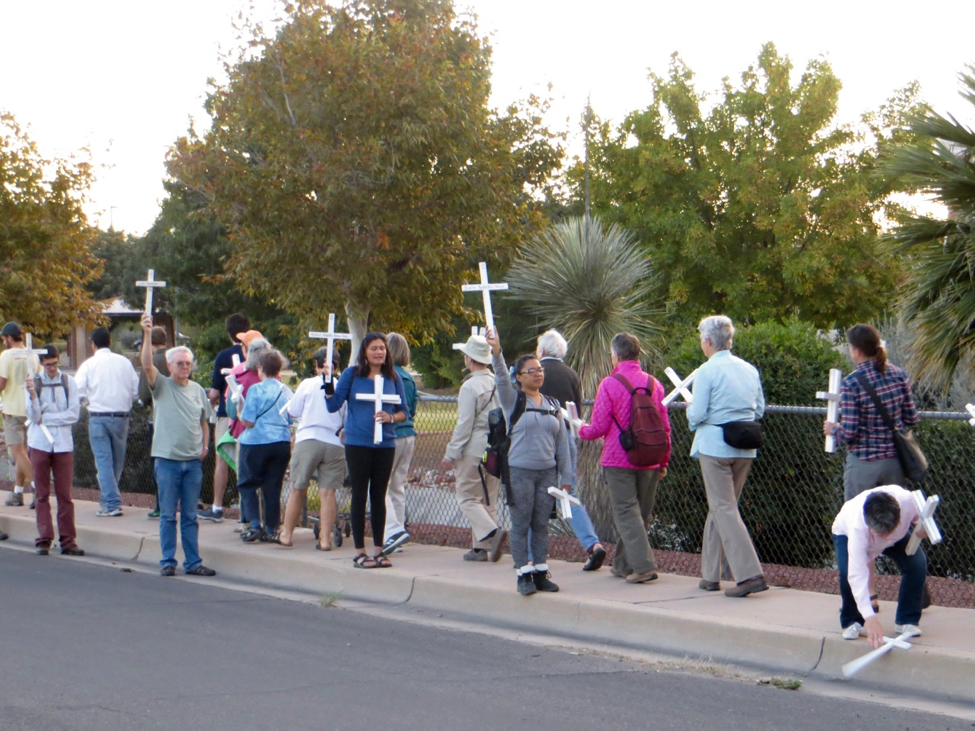 We presented this and more on the 19th. We replicated the cross planting ceremony that we performed with Frontera de Cristo in Douglas – honoring those who gave their lives for a better life. We invited speakers knowledgeable on US border policy and the violence that is pushing people to leave their homes and risk everything to come to the US.
We presented this and more on the 19th. We replicated the cross planting ceremony that we performed with Frontera de Cristo in Douglas – honoring those who gave their lives for a better life. We invited speakers knowledgeable on US border policy and the violence that is pushing people to leave their homes and risk everything to come to the US.
Today, many in our group are at work in Portland helping where we can with individuals and families affected by our country’s immigration policies. We are advocating for Congressional action to fix this nightmare and we are endorsing efforts to divest funds in organizations invested in private prisons.
There aren’t any simple answers, we know that. But we saw our nation’s current policies in action – which waste lives, build terrible resentments, and punish desperate people who, like some of our own forebearers, are seeking better futures.
We can do so much better for them and for us.
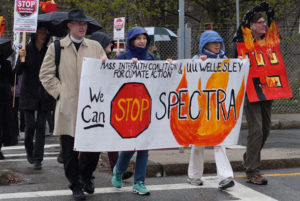
by Heather Vickery | May 6, 2016 | Environmental Justice, Youth
Last month, hundreds of UU activists from across Massachusetts commemorated Earth Day by opening a new season of resistance to the Boston-area West Roxbury Lateral Pipeline, part of a sustained and growing climate justice campaign to disrupt the dangerou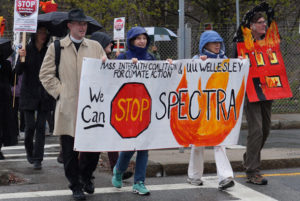 s expansion of the fracked gas infrastructure and fossil fuel economy that threatens us all. Over the last year and a half, members of UU congregations and communities across the state have organized creatively as committed people of faith building collective power to halt Spectra’s pipeline construction, succeeding on several occasions in shutting down the work site, with sustained vigils, rallies, and acts of nonviolent civil disobedience.
s expansion of the fracked gas infrastructure and fossil fuel economy that threatens us all. Over the last year and a half, members of UU congregations and communities across the state have organized creatively as committed people of faith building collective power to halt Spectra’s pipeline construction, succeeding on several occasions in shutting down the work site, with sustained vigils, rallies, and acts of nonviolent civil disobedience.
The campaign was renewed this spring with a vibrant action on April 23rd, which turned out more than 300 protestors on a rainy Saturday morning, just days after the good news that another controversial pipeline project had been canceled, with Kinder Morgan calling of further development of the Northeast Energy Direct (NED) pipeline. The crowd included high school and college students, ministers, community leaders, elected officials and residents of the neighborhood in which the pipeline would be based, posing a significant threat to community health and safety. It was followed by an act of civil disobedience, in which three activists were arrested at the construction site on April 29th, and a Celebration & Lobby Day at the Massachusetts State House on May 3rd to recognize the strides made and keep up the pressure.
These developments build upon months of organizing and training based at several UU congregations across the state, a Call to Action signed by twenty-seven UU ministers earlier this winter, as well as ongoing leadership by UU Mass Action’s Climate Justice Organizer, Evan Seitz, a friend and former staff member of the UU College of Social Justice. The “UU Rising” movement has effectively highlighted that this struggle against the Spectra pipeline is also interconnected with many other efforts for climate justice, as this pipeline is just one more outpost of destruction in a system that harms our planet and all its inhabitants, compelling our moral resistance as people of faith and conscience.
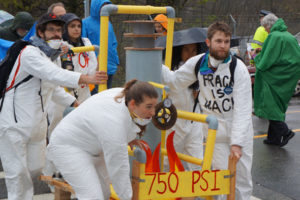 Our upcoming Activate Boston: Climate Justice training will give high school aged youth a timely and immersive opportunity to learn more about this campaign, and others like it, this summer. If you know a young person concerned about climate change and eager to take action for social justice, please encourage them to apply today, with the deadline quickly approaching and generous financial aid available to young people in need who’d like to attend.
Our upcoming Activate Boston: Climate Justice training will give high school aged youth a timely and immersive opportunity to learn more about this campaign, and others like it, this summer. If you know a young person concerned about climate change and eager to take action for social justice, please encourage them to apply today, with the deadline quickly approaching and generous financial aid available to young people in need who’d like to attend.





 s expansion of the fracked gas infrastructure and fossil fuel economy that threatens us all. Over the last year and a half, members of UU congregations and communities across the state have organized creatively as committed people of faith building collective power to halt Spectra’s pipeline construction, succeeding on several occasions in shutting down the work site, with sustained vigils, rallies, and acts of nonviolent civil disobedience.
s expansion of the fracked gas infrastructure and fossil fuel economy that threatens us all. Over the last year and a half, members of UU congregations and communities across the state have organized creatively as committed people of faith building collective power to halt Spectra’s pipeline construction, succeeding on several occasions in shutting down the work site, with sustained vigils, rallies, and acts of nonviolent civil disobedience.